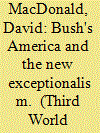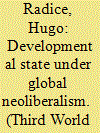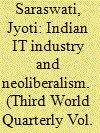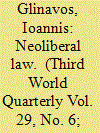|
|
|
Sort Order |
|
|
|
Items / Page
|
|
|
|
|
|
|
| Srl | Item |
| 1 |
ID:
085180


|
|
|
|
|
| Publication |
2008.
|
| Summary/Abstract |
This paper discusses the post-Washington Consensus development paradigm, questioning whether the changes it embodies are sufficient to open up the development debate. We show that the new paradigm, which might be called 'Washington Pluralism', harbours three pluralist principles. It maintains that development is 1) contingent on culture; 2) contingent on history; and 3) requiring a multidisciplinary perspective. We assess these principles on the basis of an analogy with the Malaysian Model, which embodied the same three principles. We show that, in Malaysia, the first two evolved into cultural determinism and historicism, respectively, while the third created a discourse in which institutions, politics and culture were reduced to instruments for development. Consequentially the proliferation of the idea of a Malaysian Model has been associated with increasing authoritarianism in Malaysia rather than with increased openness. On the basis of this analogy we conclude that the three pluralist principles are not sufficient to create an open development debate.
|
|
|
|
|
|
|
|
|
|
|
|
|
|
|
|
| 2 |
ID:
085176


|
|
|
|
|
| Publication |
2008.
|
| Summary/Abstract |
This article examines how the USA's growing 'Holocaust consciousness' has impacted on conservative interpretations of the transatlantic rift. Presenting the Holocaust as an antipode to US national identity has helped signal a moral divergence between the USA and Europe. The instrumentalisation of the Holocaust and anti-Semitism has allowed US conservatives to reframe norms of self-defence, victimisation, and liberation in justifying the invasion and occupation of Iraq. In the wake of Iraq claiming anti-Semitism as a 'European disease', and anti-Americanism and anti-Semitism as 'twin brothers', helps delegitimate European criticism of the war on terror. A new form of exceptionalism portrays the USA not only as the liberator of death camps and the protector of the Jewish people but, after 11 September, as a victim itself.
|
|
|
|
|
|
|
|
|
|
|
|
|
|
|
|
| 3 |
ID:
085179


|
|
|
|
|
| Publication |
2008.
|
| Summary/Abstract |
The developmental state remains one of the chief points of reference, both analytical and political, for those who reject the current neoliberal global order. In this paper the validity of this approach is examined theoretically and historically. After a preliminary description of the developmental state, the paper investigates in turn the four terms contained in the title-neoliberalism, globality, the state and development-from a historical materialist standpoint. It is then argued that any approach that aims to provide an effective roadmap for a progressive alternative to neoliberalism needs to centre its analysis on the Marxian concept of class.
|
|
|
|
|
|
|
|
|
|
|
|
|
|
|
|
| 4 |
ID:
085173


|
|
|
|
|
| Publication |
2008.
|
| Summary/Abstract |
In The Real Wealth of Nations, Eisler proposes a holistic view of the economy, which would include the caring sectors-the household, unpaid community work and the environment-as an alternative to market-oriented economic models that have proven ineffective in dealing with the problems facing our local and global communities. Her inclusion of language change as part of a strategy for economic transformation implicitly recognises the socially constitutive function of discourse, a notion put forth by critical linguists. Based on these economic and linguistic perspectives, this article reports on a study that examined the social knowledge about poverty constructed through selected discourses to determine whether they communicate a narrow or holistic view of the economy. It proposes that economic planning for poverty reduction build upon the process of language change towards a caring economy as revealed by the study.
|
|
|
|
|
|
|
|
|
|
|
|
|
|
|
|
| 5 |
ID:
085178


|
|
|
|
|
| Publication |
2008.
|
| Summary/Abstract |
Over the past decade, literature on the development of the Indian it industry has proliferated. Yet, paradoxically, an understanding of the dynamics behind this process of 'industrial catch-up' has remained limited. This can in part be attributed to the ideological flavour of the majority of studies, supported by a conventional wisdom that has attempted to draw links between the 1991 liberalisation of the Indian economy and the emergence and growth of the sector. Such works have both misrepresented the state as an obstacle to growth and overlooked its interventionist, facilitating role which, contrary to neoliberal postures, has increased substantially from the 1990s. The purpose of this paper is to evaluate this literature, taking as point of departure a more rounded empirical account, bringing out the integral role of the state in promoting and determining the character of the Indian it industry's development
|
|
|
|
|
|
|
|
|
|
|
|
|
|
|
|
| 6 |
ID:
085177


|
|
|
|
|
| Publication |
2008.
|
| Summary/Abstract |
Africanists must increasingly account for disparities in the success of the continent's democratic experiments. This paper addresses why three countries-Benin, Ghana and Mali-have become surprisingly successful democracies. The argument begins with the leftist (African socialist) regimes in each case, which set the countries on a path with unintended consequences that supported democratisation over the long run. Several key steps emerge. The leftist regimes were led by minority presidents who attempted ideological incorporation in ways that attenuated the political salience of ethnic identity. Results differed from other African regimes in the ways that neo-patrimonialism interacted with ethnicity. At Africa's critical juncture (1989-92), the lack of a dominant ethno-patrimonial coalition opened political space for more programmatic contestation. Opposition became likelier to coalesce and cohere on non-ethnic bases, and combined with constitutional militaries to make these cases among the likeliest to consolidate democracy.
|
|
|
|
|
|
|
|
|
|
|
|
|
|
|
|
| 7 |
ID:
085175


|
|
|
|
|
| Publication |
2008.
|
| Summary/Abstract |
This paper offers a critical evaluation of the interrelation of law and economics in the context of development. The paper describes the current promotion of law reform by international institutions like the World Bank as the product of neoliberal economic theory. The analysis examines the role of law historically as an expression of economic orthodoxy, arguing that the Washington Consensus has determined the shape of law reforms, pointing them to the definition and protection of private property rights, aiming to separate politics from economics. The relative failure of these policies in their application to countries emerging from communism led to the expansion of the reform agenda to include market-supporting institutions, among them the rule of law. The paper assesses the extent to which this expansion means that the role of the law and the relationship of regulation to market have changed sufficiently to denote a Post-Washington Consensus. It concludes that the use of law reform to impose what neoliberalism considers 'rational' solutions undermines the legitimacy of democratic institutions in developing and transitional countries.
|
|
|
|
|
|
|
|
|
|
|
|
|
|
|
|
| 8 |
ID:
085174


|
|
|
|
|
| Publication |
2008.
|
| Summary/Abstract |
This paper argues for an approach to researching citizenship and democracy that begins not from normative convictions but from everyday experiences in particular social, cultural and historical contexts. The paper starts with a consideration of the ways in which the terms 'democracy' and 'citizenship' have been used in the discourses and approaches taken within mainstream studies of citizenship and democracy, drawing attention to some of the conceptual blind spots that arise. We call for more attention to be paid to contextual understandings of the politics of everyday life, and to locating state, ngo and donor rhetorics and programmes promoting 'active citizenship' and 'participatory governance' within that politics. It is this kind of understanding, we suggest, that, by revealing the limits of the normativities embedded in these discourses, can provide a more substantive basis for rethinking citizenship from the perspectives of citizens themselves.
|
|
|
|
|
|
|
|
|
|
|
|
|
|
|
|
| 9 |
ID:
085172


|
|
|
|
|
| Publication |
2008.
|
| Summary/Abstract |
The debate between post-development theorists and their critics has raised several important questions, one of them being the question of how relatively privileged people may respond meaningfully to poverty while not perpetuating the flaws of past development practice. In this article I build upon the ideas of several contributors to the post-development debate in order to suggest three ways in which we who are relatively privileged may play a role in struggles against poverty. I argue that we can work to rethink the concepts informing development practice; that we may find ways to give our support to popular initiatives, and that there are aspects of our own societies which we may change in solidarity with the struggles of distant others.
|
|
|
|
|
|
|
|
|
|
|
|
|
|
|
|
| 10 |
ID:
085182


|
|
|
|
|
| Publication |
2008.
|
| Summary/Abstract |
This paper examines why the Singapore developmental state, unlike the other East Asian developmental states, has shown no signs of devolving but instead appears to be strengthening its position within society by embarking upon several 'post-industrial' economic programmes. By utilising a class relations perspective, the paper argues that the resilience of the Singapore developmental state results from the continued weakness of the domestic capitalist class as well as from the state's collaboration with transnational capital and government-linked corporations. At the same time the working class has continuously been 'incorporated' by the state. To illustrate these processes, the paper examines Singapore's Biomedical Sciences Initiative, and the Work Restructuring Scheme, which have reinforced the supremacy of the Singapore developmental state, particularly in the economic sphere. The paper concludes that developmental states need not necessarily devolve, if they can continue to provide economic growth as well as to carefully 'manage' class relations in society.
|
|
|
|
|
|
|
|
|
|
|
|
|
|
|
|
|
|
|
|
|